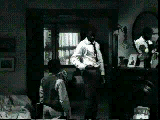|
Lorraine Hansberry's A Raisin in the Sun |
|
|
TABLE OF CONTENTS |
Character analysis: Travis Younger "Maybe it just sags / Like a heavy load"
Throughout the play, Travis feels the pressure to think big and be better than his predecessors. The growing pains of becoming a man are evident in his relationship with his parents. Ruth wants her son to understand hardship so that he grows up with the determination to succeed out of his lower class status. Walter also feels this way, but oftentimes counteracts Ruth's efforts as he strives to prove he can sufficiently provide for his son. An example of this conflict is Ruth refusing to give Travis fifty cents which is later overruled by Walter when he gives Travis one dollar. Metaphorically, Travis is being pushed and pulled in multiple directions by each person's vision of what is best for his future. As a result of Walter's dynamic mood changes, Ruth sometimes encourages Travis to be like his father and other times directs him away from mimicking Walter's actions. Like Mama says, children are hoped to be the driving force behind dreams by making them seem important [35]. For Walter, his unrelenting need to be something better is undeniably perpetuated by his desire to give his son a better life filled with richer opportunities than he had as a young man. Walter's decision to go ahead with the move to the white neighborhood is greatly influenced by the effects it will have on Travis' future. Until Travis is old enough to have control of his own destiny, his future hopes and dreams are at the mercy of his family's dreams. Walter wants to give Travis the world, and Travis must stand strong under the pressure not to waste it.
|
 The
Art of Social Criticism:
The
Art of Social Criticism:  As
the sixth generation of the family in America, Travis' existence is
a testament to the hard work and struggles of his ancestors [
As
the sixth generation of the family in America, Travis' existence is
a testament to the hard work and struggles of his ancestors [